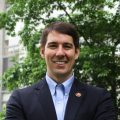16th Assembly District
Not in 16th Assembly District? Find your guide.
RETURN BALLOTS BY TUESDAY, MARCH 3RD
The Courage California Voter Guide compiles the information that allows you to make informed decisions about the races on your ballot, based on your values. Vote in every race on your ballot! It's our right and our responsibility. Please share this guide with your friends and family.
Have questions about voting in Contra Costa County? Find out how to vote in Contra Costa County.
Congress
8th Congressional District
Christine “Chris” Bubser is from Pennsylvania and has lived in Mammoth Lakes for over 13 years. According to campaign materials, she’s running for office to bring responsive representation to California’s 8th Congressional district.
Bubser is a biotech engineer and healthcare advocate. The 2017 attempts to dismantle the Affordable Care Act led her to advocate in Washington, and she decided to run for office after the indifference she experienced. In her community, Bubser is a trustee at her Temple and a co-founder of HODG (HangOutDoGood), a grassroots community of hundreds of volunteers who work to elect progressive candidates.
Bubser is running against nine other candidates: Bob Conaway (D), James Ellars (D), Tim Donnelly (R), Jerry Laws (R), Jay Obernolte (R), Jeremy Staat (R), Justin David Whitehead (R), Jeff Esmus (NPP). Incumbent Paul Cook (R) is not seeking re-election. Recent election results show it's hard for Democrats to win this seat. Chris Bubser is the best progressive choice thanks to endorsements from over a dozen progressive organizations, elected officials, and community leaders.
According to our analysis, Chris Bubser is the strongest choice for progressive leadership in office.
Christine “Chris” Bubser is from Pennsylvania and has lived in Mammoth Lakes for over 13 years. According to campaign materials, she’s running for office to bring responsive representation to California’s 8th Congressional district.
Bubser is a biotech engineer and healthcare advocate. The 2017 attempts to dismantle the Affordable Care Act led her to advocate in Washington, and she decided to run for office after the indifference she experienced. In her community, Bubser is a trustee at her Temple and a co-founder of HODG (HangOutDoGood), a grassroots community of hundreds of volunteers who work to elect progressive candidates.
Bubser is running against nine other candidates: Bob Conaway (D), James Ellars (D), Tim Donnelly (R), Jerry Laws (R), Jay Obernolte (R), Jeremy Staat (R), Justin David Whitehead (R), Jeff Esmus (NPP). Incumbent Paul Cook (R) is not seeking re-election. Recent election results show it's hard for Democrats to win this seat. Chris Bubser is the best progressive choice thanks to endorsements from over a dozen progressive organizations, elected officials, and community leaders.
According to our analysis, Chris Bubser is the strongest choice for progressive leadership in office.
10th Congressional District
Rep. Josh Harder lives in his hometown of Turlock, CA. He is the incumbent, having beat the sitting republican in a tight race in 2018, which helped Democrats to win back control of Congress. According to campaign materials, Harder is running for re-election to protect access to health care, create good-paying jobs, reform our broken immigration system, and to secure and grow his area’s water supply.
In Congress, Rep. Harder has advocated for the needs of the agriculture industry by addressing issues of climate change, and has fought to support California’s farmers. Rep. Harder currently sits on the House Committees on Education and Labor, as well as the Agriculture Committee. Prior to serving in congress, Harder was a business professor at Modesto Junior College. Harder has also passed on his small business knowledge to developing economies through volunteer efforts. While working at Boston Consulting Group, he took a leave of absence to help small farmers in Kenya and Uganda organize for economic cooperation and development.
Rep. Harder is running against Michael “Mike” Barkley (D), Ryan Blevins (D), Bob Elliot (R), Maria Sousa Livengood (R), and Ted Howze (R). According to recent election results, it's difficult for Democrats to win this seat as Rep. Harder did in 2018. His strong progressive track record as well as his recent win in a recently flipped district make him the strongest choice in this race.
Rep. Josh Harder lives in his hometown of Turlock, CA. He is the incumbent, having beat the sitting republican in a tight race in 2018, which helped Democrats to win back control of Congress. According to campaign materials, Harder is running for re-election to protect access to health care, create good-paying jobs, reform our broken immigration system, and to secure and grow his area’s water supply.
In Congress, Rep. Harder has advocated for the needs of the agriculture industry by addressing issues of climate change, and has fought to support California’s farmers. Rep. Harder currently sits on the House Committees on Education and Labor, as well as the Agriculture Committee. Prior to serving in congress, Harder was a business professor at Modesto Junior College. Harder has also passed on his small business knowledge to developing economies through volunteer efforts. While working at Boston Consulting Group, he took a leave of absence to help small farmers in Kenya and Uganda organize for economic cooperation and development.
Rep. Harder is running against Michael “Mike” Barkley (D), Ryan Blevins (D), Bob Elliot (R), Maria Sousa Livengood (R), and Ted Howze (R). According to recent election results, it's difficult for Democrats to win this seat as Rep. Harder did in 2018. His strong progressive track record as well as his recent win in a recently flipped district make him the strongest choice in this race.
State Assembly, 16th District
Rebecca Bauer-Kahan was raised in the Bay Area. She is the incumbent, having served in this position since 2018. According to campaign materials she is running for re-election to continue to use her leadership position to advocate for social issues and improve equity in the community.
In the State Assembly, Bauer-Kahan has worked on legislation to reallocate public funding to parks and schools and transportation projects, to protect women’s health and abortion rights, to codify standards for serving food allergens, and to instate protections for California college students. Shortly after her election in 2018, she was selected to serve as Assistant Speaker pro Tempore in the Assembly. She currently serves as Chair of the Select Committee on Women’s Reproductive Health, and sits on an additional four committees, including Environmental Safety & Toxic Materials, Privacy and Consumer Protection, Public Safety, and Banking & Finance.
Prior to her election to the State Assembly, Bauer-Kahan worked as an attorney, primarily on cases related to corporate environmental compliance and intellectual property. Her work involved an investigation of company practices, a detailed understanding of existing regulations, and how to balance compliance with profitability. Additionally, she has taught law at Santa Clara University and Golden Gate University. Bauer-Kahan has also used her professional credentials to benefit her community by growing her office’s pro-bono program to address cases related to civil rights and homelessness, and by partnering with the International Refugee Assistance Project (IRAP) to provide legal services at San Francisco International Airport after the Trump Administration’s travel ban.
Bauer-Kahan is being challenged by Joseph Rubay (R). In 2019, she scored an 81 out of 100 on Courage Score, our annual analysis of legislator's progressive voting records. Based on our Courage Score analysis, Bauer-Kahan has consistently shown great courage in advocating for the needs of constituents and facing down corporate lobbyists and interest groups that exploit Californians.
According to our analysis, Rebecca Bauer-Kahan is the strongest choice for progressive leadership in office.
Rebecca Bauer-Kahan was raised in the Bay Area. She is the incumbent, having served in this position since 2018. According to campaign materials she is running for re-election to continue to use her leadership position to advocate for social issues and improve equity in the community.
In the State Assembly, Bauer-Kahan has worked on legislation to reallocate public funding to parks and schools and transportation projects, to protect women’s health and abortion rights, to codify standards for serving food allergens, and to instate protections for California college students. Shortly after her election in 2018, she was selected to serve as Assistant Speaker pro Tempore in the Assembly. She currently serves as Chair of the Select Committee on Women’s Reproductive Health, and sits on an additional four committees, including Environmental Safety & Toxic Materials, Privacy and Consumer Protection, Public Safety, and Banking & Finance.
Prior to her election to the State Assembly, Bauer-Kahan worked as an attorney, primarily on cases related to corporate environmental compliance and intellectual property. Her work involved an investigation of company practices, a detailed understanding of existing regulations, and how to balance compliance with profitability. Additionally, she has taught law at Santa Clara University and Golden Gate University. Bauer-Kahan has also used her professional credentials to benefit her community by growing her office’s pro-bono program to address cases related to civil rights and homelessness, and by partnering with the International Refugee Assistance Project (IRAP) to provide legal services at San Francisco International Airport after the Trump Administration’s travel ban.
Bauer-Kahan is being challenged by Joseph Rubay (R). In 2019, she scored an 81 out of 100 on Courage Score, our annual analysis of legislator's progressive voting records. Based on our Courage Score analysis, Bauer-Kahan has consistently shown great courage in advocating for the needs of constituents and facing down corporate lobbyists and interest groups that exploit Californians.
According to our analysis, Rebecca Bauer-Kahan is the strongest choice for progressive leadership in office.
State Senator, 9th District
Nancy Skinner has lived in Berkley, CA for over 40 years. She is the incumbent State Senator in District 9, having served in this position since 2017. According to campaign materials, she is running for re-election to continue to build on her record of fighting for criminal justice reform, affordable housing, and increased environmental protections across the state.
In the State Senate, Skinner has authored two significant criminal justice reform bills to increase police accountability and overhaul the felony murder rule. She has also authored legislation to improve California’s affordable housing shortage, and to protect the environment through the reduction of greenhouse gas emissions. Skinner currently serves as the Chair of the Public Safety Committee and the Public Safety Budget Committee, and is a member of an additional six committees. Prior to her election to the State Senate, Skinner served three terms in the State Assembly, was the first student to be elected to the Berkeley City Council, and served as the Executive Director of ICLEI’s United States office which worked with international cities to stop climate change. As a graduate Student at Berkeley, Skinner co-founded the labor union that represents graduate student instructors.
Nancy Skinner is running unopposed in this race. She scores a lifetime 97 out of 100 on Courage Score, our annual analysis of legislators’ progressive voting record. Based on our Courage Score analysis, Skinner has consistently shown great courage by advocating for the needs of constituents and facing down corporate lobbyists and interest groups that exploit Californians.
According to our analysis, Nancy Skinner is the strongest choice for progressive leadership in office.
Nancy Skinner has lived in Berkley, CA for over 40 years. She is the incumbent State Senator in District 9, having served in this position since 2017. According to campaign materials, she is running for re-election to continue to build on her record of fighting for criminal justice reform, affordable housing, and increased environmental protections across the state.
In the State Senate, Skinner has authored two significant criminal justice reform bills to increase police accountability and overhaul the felony murder rule. She has also authored legislation to improve California’s affordable housing shortage, and to protect the environment through the reduction of greenhouse gas emissions. Skinner currently serves as the Chair of the Public Safety Committee and the Public Safety Budget Committee, and is a member of an additional six committees. Prior to her election to the State Senate, Skinner served three terms in the State Assembly, was the first student to be elected to the Berkeley City Council, and served as the Executive Director of ICLEI’s United States office which worked with international cities to stop climate change. As a graduate Student at Berkeley, Skinner co-founded the labor union that represents graduate student instructors.
Nancy Skinner is running unopposed in this race. She scores a lifetime 97 out of 100 on Courage Score, our annual analysis of legislators’ progressive voting record. Based on our Courage Score analysis, Skinner has consistently shown great courage by advocating for the needs of constituents and facing down corporate lobbyists and interest groups that exploit Californians.
According to our analysis, Nancy Skinner is the strongest choice for progressive leadership in office.
Contra Costa County, District 3
Depending on where you live, you may have the below county-districted races on your ballot.
Diane Burgis lives in Oakley with her family and has lived in Contra Costa County for most of her life. She has served as the Supervisor for District 3 for three years. According to campaign materials she is running for re-election to continue advocating for responsible environmental stewardship, improved transportation infrastructure, and effective delivery of county services.
As the Supervisor for the County’s largest geographic district, Diane serves on over two dozen committees including the 2020 Census, the Delta Protection Commission, and the Contra Costa County Family Justice Center. Before her election to the Contra Costa County Board of Supervisors, she served in the East Bay Regional Park District as the Ward 7 Director. While there, she managed a $205 million budget for over 120,000 acres in both Alameda and Contra Costa County.
Diane Burgis is running against Paul Seger, who serves on the Board of Directors for the Diablo Water Project. Despite Paul Seger’s seemingly progressive agenda, Diane Burgis' notable strong support from local officials and organizations make her the stronger candidate.
According to our analysis, Diane Burgis is the strongest choice for progressive leadership in office.
Diane Burgis lives in Oakley with her family and has lived in Contra Costa County for most of her life. She has served as the Supervisor for District 3 for three years. According to campaign materials she is running for re-election to continue advocating for responsible environmental stewardship, improved transportation infrastructure, and effective delivery of county services.
As the Supervisor for the County’s largest geographic district, Diane serves on over two dozen committees including the 2020 Census, the Delta Protection Commission, and the Contra Costa County Family Justice Center. Before her election to the Contra Costa County Board of Supervisors, she served in the East Bay Regional Park District as the Ward 7 Director. While there, she managed a $205 million budget for over 120,000 acres in both Alameda and Contra Costa County.
Diane Burgis is running against Paul Seger, who serves on the Board of Directors for the Diablo Water Project. Despite Paul Seger’s seemingly progressive agenda, Diane Burgis' notable strong support from local officials and organizations make her the stronger candidate.
According to our analysis, Diane Burgis is the strongest choice for progressive leadership in office.
Statewide Ballot Measures
This proposition would provide $9 billion for desperately needed renovations to public preschools and grade schools throughout the state, and $6 billion for construction to community colleges, the Cal State system, and the UC system. This will allow the state of California to use tax revenue to pay for improvements that local communities cannot afford.
The funding would come from bonds the state would pay back over 35 years, totaling an estimated $26 billion, which includes $15 billion in principal and $11 billion in interest. This investment is well worth the costs. It takes money, after all, to ensure that students -- especially those in districts that can’t afford major capital improvement projects -- do not have to learn in dangerous environments.
The vast majority of Democrats in the state legislature support it, as does Gov. Newsom, and the only major opposition is a group called the Howard Jarvis Taxpayers Association. This is the group famous for destroying California’s school funding system in 1978 through another proposition, ironically one that was also dubbed Prop 13. The group spends most of its time lobbying to reduce tax rates. It has never shown any interest in supporting California’s children, at least if that means wealthy individuals or giant corporations would pay their fair share in taxes.
Critics of the measure have pointed out that the ballot measure’s language includes a provision that frees new multi-family developments around subway stops and bus stations from school impact fees. This provision will make it easier for developers to build apartment buildings within a half-mile of public transit but could also drive up the cost of new housing and take funds away from school districts across the state. Despite this provision, the measure is still supported by most education groups in the state, who believe the overall funding allocation to schools outweighs the impact of reduced funding to school districts located near transit hubs. 2020’s Prop 13 is worth the investment since it means children will soon be able to attend school in buildings that are retrofitted to withstand earthquakes and no longer have lead in their water.
We strongly recommend a YES vote on Prop 13.
This proposition would provide $9 billion for desperately needed renovations to public preschools and grade schools throughout the state, and $6 billion for construction to community colleges, the Cal State system, and the UC system. This will allow the state of California to use tax revenue to pay for improvements that local communities cannot afford.
The funding would come from bonds the state would pay back over 35 years, totaling an estimated $26 billion, which includes $15 billion in principal and $11 billion in interest. This investment is well worth the costs. It takes money, after all, to ensure that students -- especially those in districts that can’t afford major capital improvement projects -- do not have to learn in dangerous environments.
The vast majority of Democrats in the state legislature support it, as does Gov. Newsom, and the only major opposition is a group called the Howard Jarvis Taxpayers Association. This is the group famous for destroying California’s school funding system in 1978 through another proposition, ironically one that was also dubbed Prop 13. The group spends most of its time lobbying to reduce tax rates. It has never shown any interest in supporting California’s children, at least if that means wealthy individuals or giant corporations would pay their fair share in taxes.
Critics of the measure have pointed out that the ballot measure’s language includes a provision that frees new multi-family developments around subway stops and bus stations from school impact fees. This provision will make it easier for developers to build apartment buildings within a half-mile of public transit but could also drive up the cost of new housing and take funds away from school districts across the state. Despite this provision, the measure is still supported by most education groups in the state, who believe the overall funding allocation to schools outweighs the impact of reduced funding to school districts located near transit hubs. 2020’s Prop 13 is worth the investment since it means children will soon be able to attend school in buildings that are retrofitted to withstand earthquakes and no longer have lead in their water.
We strongly recommend a YES vote on Prop 13.
Lafayette Ballot Measures
Depending on where you live, you may have the following city measures on your ballot.
Wondering why there are always school funding props on your ballot? It’s probably because the state of California ranks near the bottom in per-pupil spending and local communities are left to make up a lot of the shortfall. The state also allocates its money to prioritize districts with high concentrations of English language learners, low income, and/or foster youth as students -- a policy with which we very much agree! That said, Lafayette doesn’t have many students in those categories, so it hasn’t benefited much from recent increases in state funding. Still, Lafayette’s public schools are some of the best in the state, and that’s of incredible value to the community.
In this measure, owners of a parcel of land are being asked to pay an additional $290 towards local schools to help the district cover rising costs. The local Governing Board has already cut almost $3 million in staff and instructional programs from the District’s General Fund, so while a tax increase is not ideal since residents of the district already pay high school taxes, the measure is worth the cost to ensure the district can meet its funding obligations without cutting services or programs further. The tax increase also has a seven-year limit, so voters will get to review whether the money was well-spent at that time. The measure requires a two-thirds majority to pass.
We strongly recommend a YES vote on Measure L.
Wondering why there are always school funding props on your ballot? It’s probably because the state of California ranks near the bottom in per-pupil spending and local communities are left to make up a lot of the shortfall. The state also allocates its money to prioritize districts with high concentrations of English language learners, low income, and/or foster youth as students -- a policy with which we very much agree! That said, Lafayette doesn’t have many students in those categories, so it hasn’t benefited much from recent increases in state funding. Still, Lafayette’s public schools are some of the best in the state, and that’s of incredible value to the community.
In this measure, owners of a parcel of land are being asked to pay an additional $290 towards local schools to help the district cover rising costs. The local Governing Board has already cut almost $3 million in staff and instructional programs from the District’s General Fund, so while a tax increase is not ideal since residents of the district already pay high school taxes, the measure is worth the cost to ensure the district can meet its funding obligations without cutting services or programs further. The tax increase also has a seven-year limit, so voters will get to review whether the money was well-spent at that time. The measure requires a two-thirds majority to pass.
We strongly recommend a YES vote on Measure L.




